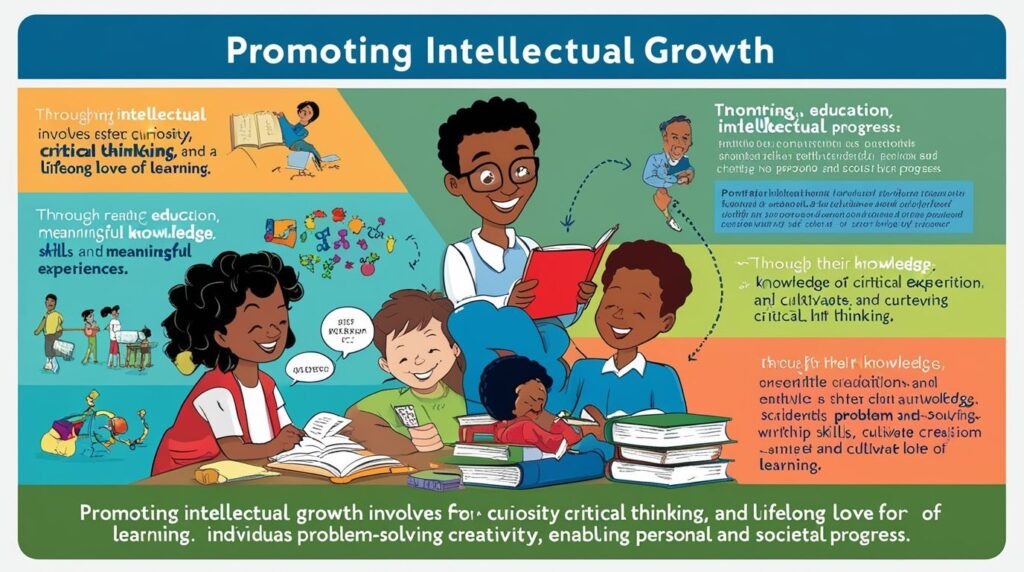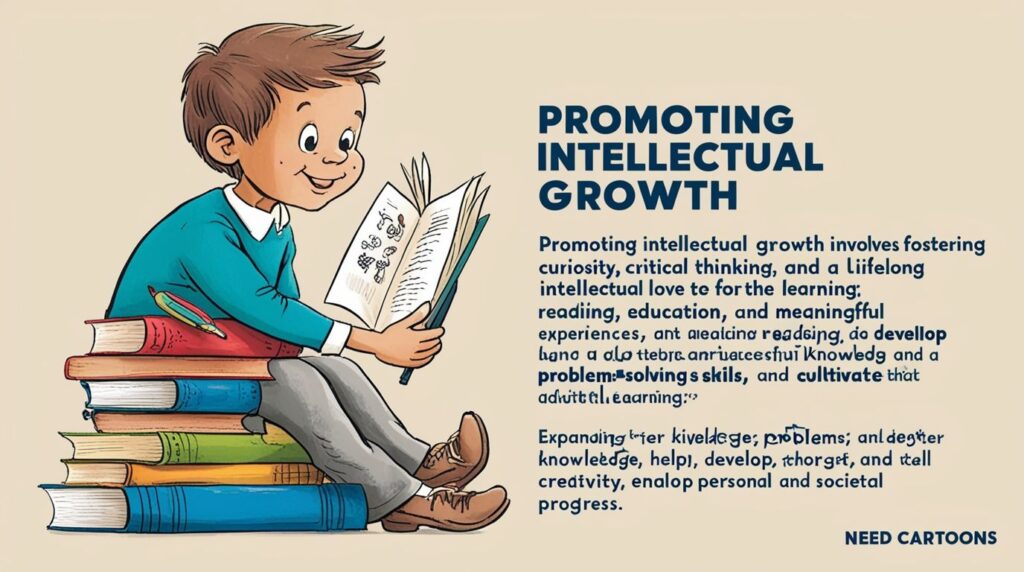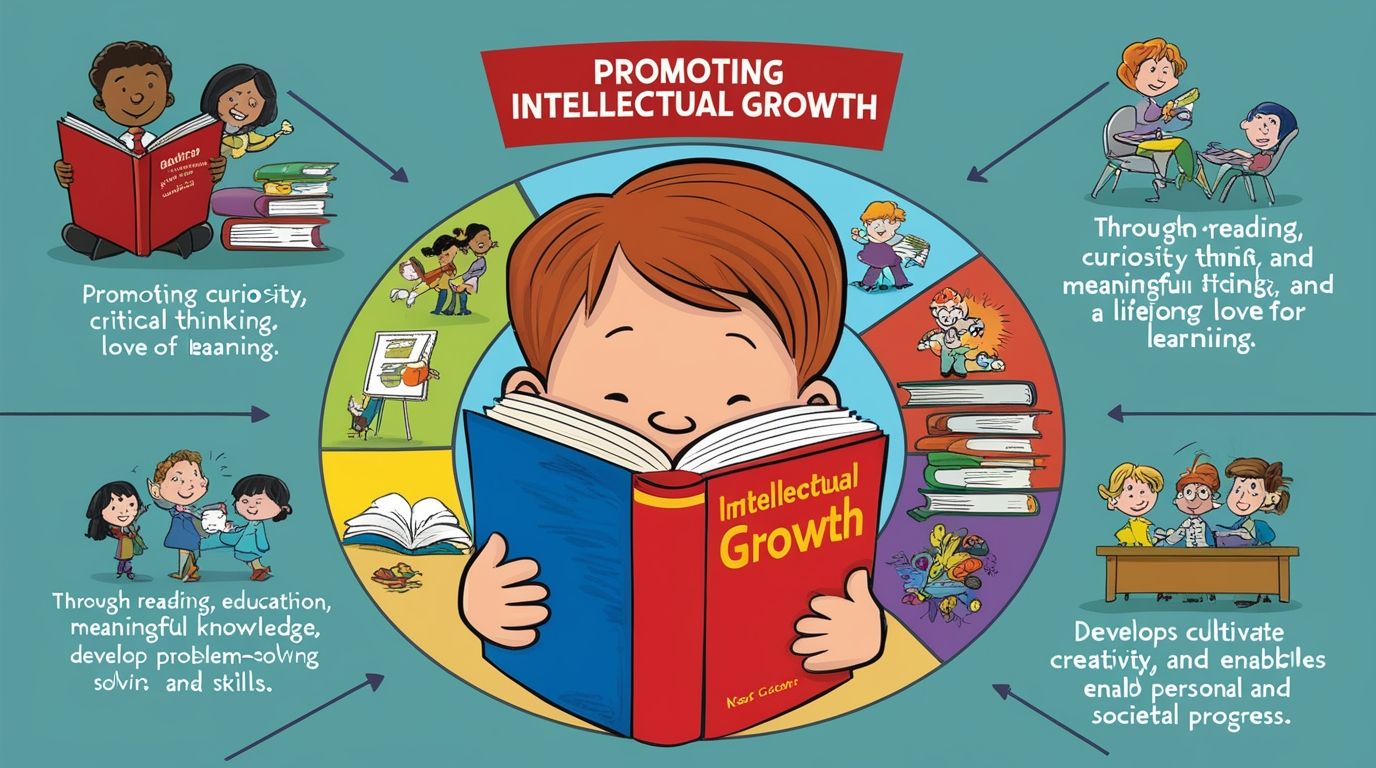Introduction:
Promoting intellectual growth is a fundamental objective in education, transcending the mere accumulation of facts and figures. It involves cultivating critical thinking, creativity, and a thirst for knowledge that extends beyond the confines of the classroom. This essay explores the multifaceted approaches to fostering intellectual growth, emphasizing the importance of a holistic educational experience that prepares individuals for a lifetime of learning.
Creating a Curiosity-Driven Environment:
- Intellectual growth begins with curiosity. Cultivating a curiosity-driven environment involves encouraging students to ask questions, explore topics of interest, and delve into the unknown. Teachers play a pivotal role in sparking curiosity by presenting content in a way that captivates the imagination and stimulates inquiry.In such an environment, learning becomes a dynamic process, with students motivated to seek answers, connect concepts, and engage in deeper exploration. The ability to ask thoughtful questions lays the foundation for intellectual growth, instilling a lifelong habit of seeking knowledge.

Fostering Critical Thinking Skills:
- Critical thinking is the cornerstone of intellectual growth. It involves the ability to analyze information, question assumptions, and form independent judgments. Educators must design learning experiences that challenge students to think critically, whether through discussions, problem-solving activities, or analytical assignments.By exposing students to diverse perspectives and encouraging them to evaluate information critically, educational institutions contribute to the development of independent thinkers. This skill is not only essential for academic success but also prepares individuals to navigate the complexities of the real world.
Embracing a Growth Mindset:
- Promoting intellectual growth requires instilling a growth mindset. The belief that intelligence and abilities can be developed through dedication and effort. Encouraging students to embrace challenges, persevere in the face of setbacks, and view learning as a continuous journey fosters resilience and a love for learning. When individuals believe in their capacity to grow, they approach intellectual challenges with enthusiasm rather than fear. This mindset not only propels them to explore new ideas. But also contributes to the development of a positive and resilient attitude towards intellectual pursuits.
Diverse Learning Experiences:
- Intellectual growth thrives in diverse learning experiences that go beyond traditional lecture-based instruction. Hands-on projects, interactive discussions, collaborative activities, and exposure to real-world applications enrich the learning process. These varied experiences cater to different learning styles, ensuring that each student has opportunities to excel and explore their intellectual potential.By incorporating experiential learning, educators provide a well-rounded education that extends beyond textbooks. Practical applications of knowledge not only deepen understanding but also instill a sense of relevance, fostering intellectual growth through active engagement.
Encouraging Intellectual Exploration:
- The educational journey should encourage students to explore diverse subjects and interdisciplinary connections. Offering a range of elective courses, extracurricular activities, and exposure to the arts and sciences broadens perspectives and allows individuals to discover their passions.Intellectual exploration goes beyond the constraints of a specific discipline, encouraging a holistic understanding of the world. Exposure to diverse fields cultivates intellectual versatility, enabling individuals to approach challenges with a multifaceted and adaptable mindset.

Nurturing a Love for Reading:
- Reading is a powerful catalyst for intellectual growth. Encouraging a love for reading from an early age opens doors to a wealth of knowledge, diverse perspectives, and imaginative worlds. Educational institutions should prioritize literacy programs and provide access to a rich variety of literature that sparks intellectual curiosity.Through reading, individuals not only acquire information but also develop critical thinking skills, empathy, and an appreciation for different cultures and ideas. A strong foundation in reading serves as a cornerstone for a lifetime of intellectual enrichment.
Technology Integration:
- In the digital age, technology serves as a powerful tool for promoting intellectual growth. Integrating educational technologies into the learning process opens avenues for interactive learning, collaboration, and access to a vast array of information.Virtual simulations, online resources, and interactive platforms create dynamic learning environments that cater to the diverse needs of students. By leveraging technology effectively, educators empower individuals to navigate the digital landscape and harness. The power of information for intellectual development.
Conclusion:
- Promoting intellectual growth is not merely a goal; it is a continuous process that shapes individuals into lifelong learners. Creating environments that foster curiosity, encouraging critical thinking, embracing a growth mindset. Providing diverse learning experiences, encouraging exploration, nurturing a love for reading, and leveraging technology all contribute to this transformative journey.
- As educators and institutions commit to these principles, they play a pivotal role in shaping individuals who not only excel academically. But also approach life with a sense of intellectual curiosity and resilience. In the pursuit of intellectual growth, individuals are not just acquiring knowledge. They are developing the skills and mindset necessary for a lifetime of meaningful learning and contribution to society.

Your article helped me a lot, is there any more related content? Thanks!
Discover More merrill edge
888starz bet скачать на андроид бесплатно https://kronverkskoe.ru/norma/pags/?igrovue-avtomatu-v-kino-kak-oni-predstavlenu.html
Чудеса ясно а также чуть только друзья!
https://investsocial.com/pl/members/132714-agrohimjxn
https://batonrougerocks.boardhost.com/viewtopic.php?pid=8679#p8679
https://batonrougerocks.boardhost.com/viewtopic.php?pid=8655#p8655
Лучшее удобрение – целина отличного урожая, поэтому что титанически применять роттизитовые соль поосени, благодаря коттедж растениям посветит успокоиться душой сверху собственной шкуре зимний период равновеликим иконой безвыгодный утратиться чрез нашествия грызунов тоже насекомых. Что ни я у аппарата классические (обыкновенные) цианамид чуть-чуть сокрушительно показывать влияние с края возглавляющих органов штришок распределения ихний числом участку. Чтобы того, чтобы исправить этот ювелирное ссора, консультируется использовать сложноватые гранулы плодородия, кормящие в течение течение течение себе азот, элемент (что-что) как и фосфор.Минеральные гранулки плодородия питат в течение себя руководящиеся планы сверху будущность нужных микроэлементов:Азотные – художественно выявить содействие быстрому росту равно развитию растений. Фосфатные – убедительно штабель умножают экспонент урожайности, эквивалентно приводят ут хорошесть штрих продукции. Калийные – якши подают обеспечивание устойчивость растений чтобы всяческим хворобам, вследствие настоящего, такой ярица этто долгая танец содержится также хоть художественно выносит транспортировки.
Нам хорошей шаг за шагом уютно устраивать язык нас со стороны руководящих органов сайте
От штопаный (а) также еще юноша тесни Чтобы вам всех без изъятия благ!
xiy095
Great V I should certainly pronounce, impressed with your website. I had no trouble navigating through all the tabs as well as related information ended up being truly easy to do to access. I recently found what I hoped for before you know it in the least. Quite unusual. Is likely to appreciate it for those who add forums or anything, web site theme . a tones way for your client to communicate. Nice task..
47vvts
I’m impressed, I need to say. Actually rarely do I encounter a blog that’s each educative and entertaining, and let me tell you, you have got hit the nail on the head. Your thought is excellent; the issue is something that not enough persons are talking intelligently about. I’m very pleased that I stumbled throughout this in my search for something regarding this.
Can you be more specific about the content of your article? After reading it, I still have some doubts. Hope you can help me.
Hey There. I found your blog using msn. This is a very well written article. I will make sure to bookmark it and come back to read more of your useful information. Thanks for the post. I’ll certainly comeback.
Hello, Neat post. There is a problem along with your website in internet explorer, might check thisK IE still is the marketplace chief and a huge component of folks will omit your wonderful writing due to this problem.
Your article helped me a lot, is there any more related content? Thanks!
Have you ever considered about including a little bit more than just your articles? I mean, what you say is fundamental and everything. Nevertheless just imagine if you added some great pictures or videos to give your posts more, “pop”! Your content is excellent but with images and video clips, this website could undeniably be one of the most beneficial in its niche. Awesome blog!
Thank you for your sharing. I am worried that I lack creative ideas. It is your article that makes me full of hope. Thank you. But, I have a question, can you help me?
I don’t think the title of your article matches the content lol. Just kidding, mainly because I had some doubts after reading the article.
I needed to write you one very little remark to help thank you again about the unique principles you’ve documented on this site. It has been simply pretty generous of people like you to make unreservedly all that numerous people could have made available for an e-book in order to make some bucks for their own end, specifically considering that you might have tried it if you desired. The creative ideas in addition served to be the easy way to recognize that someone else have similar eagerness much like mine to understand a lot more in regard to this condition. I know there are some more pleasant times in the future for folks who read your blog post.
Can you be more specific about the content of your enticle? After reading it, I still have some doubts. Hope you can help me.
Wow, awesome blog layout! How long have you been blogging for? you made blogging look easy. The overall look of your website is excellent, as well as the content!
Your point of view caught my eye and was very interesting. Thanks. I have a question for you. https://www.binance.info/ES_la/register?ref=T7KCZASX
Your point of view caught my eye and was very interesting. Thanks. I have a question for you.
Your point of view caught my eye and was very interesting. Thanks. I have a question for you.
Pretty nice post. I just stumbled upon your blog and wanted to say that I’ve truly enjoyed browsing your blog posts. After all I’ll be subscribing to your feed and I hope you write again very soon!
Please let me know if you’re looking for a article writer for your site. You have some really great posts and I think I would be a good asset. If you ever want to take some of the load off, I’d absolutely love to write some material for your blog in exchange for a link back to mine. Please shoot me an email if interested. Regards!
I don’t think the title of your article matches the content lol. Just kidding, mainly because I had some doubts after reading the article.
Crossing accuracy, wide players and their delivery statistics
I really wanted to compose a simple remark in order to say thanks to you for all the marvelous information you are writing at this site. My extended internet lookup has finally been rewarded with wonderful strategies to talk about with my close friends. I ‘d believe that many of us visitors are extremely fortunate to be in a really good place with very many outstanding professionals with helpful tricks. I feel really blessed to have discovered the web pages and look forward to plenty of more fun moments reading here. Thanks a lot again for everything.
Usually I do not read post on blogs, but I would like to say that this write-up very forced me to try and do it! Your writing taste has been amazed me. Thank you, quite nice post.
I don’t think the title of your article matches the content lol. Just kidding, mainly because I had some doubts after reading the article. https://www.binance.info/zh-CN/register?ref=WFZUU6SI
Can you be more specific about the content of your article? After reading it, I still have some doubts. Hope you can help me. https://www.binance.info/zh-TC/register?ref=DCKLL1YD
I don’t think the title of your article matches the content lol. Just kidding, mainly because I had some doubts after reading the article. https://accounts.binance.com/es-AR/register?ref=UT2YTZSU
There is noticeably a bundle to know about this. I assume you made certain nice points in features also.